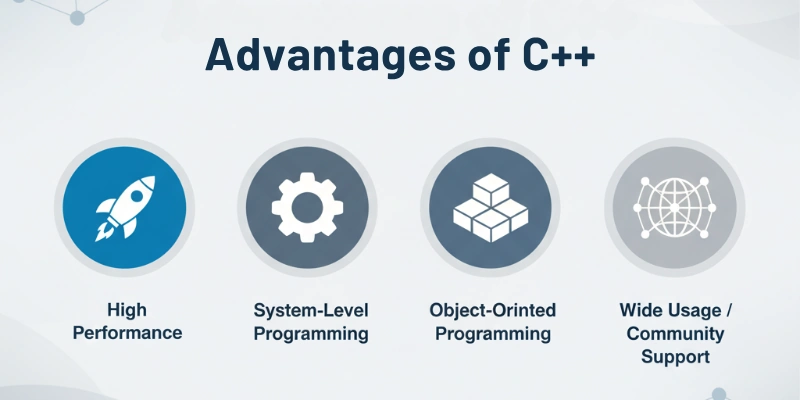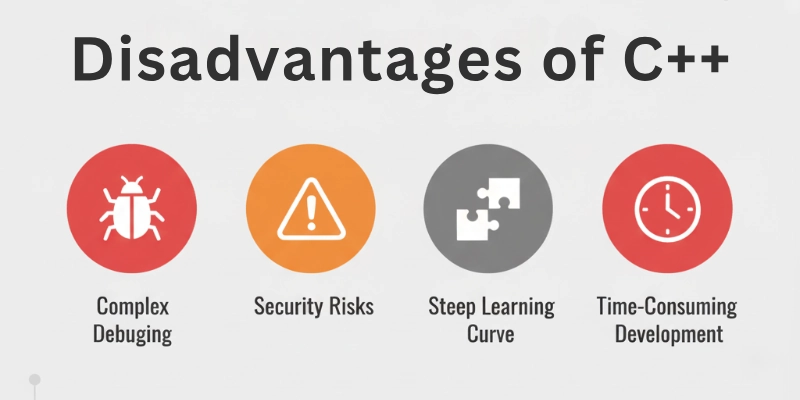Advantages and Disadvantages of C++: Pros vs Cons
Published: 18 Sep 2025
C++ is widely used in computer science and software development. It has various advantages, including being powerful and flexible and allowing programmers to write complicated programs and applications. However, like anything else, C++ has its downsides.
Understanding both the advantages and disadvantages of C++ can help you guys decide whether it’s the right language for your projects.
So, without further ado, let’s cover all the pros and cons of C++ in detail.
Advantages of C++
C++ offers numerous benefits, making it a popular choice among programmers.

Here are some advantages of using C++:
- High Performance
- Versatility
- Platform Independence
- Object-Oriented Support
- Extensive Library Support
- Compatibility with C
- Strong Community
- Efficient Resource Management
- Flexible Memory Management
- Reusable Code
- System Programming
- Hardware Control
- Complexity Handling
- Multi-Paradigm Support
- Scalability & Maintainability
Let’s cover each pros of the C++ language in detail.
1. High Performance
C++ is very fast and powerful. It runs close to the machine level, so programs execute quickly. This makes it perfect for games, big apps, and real-time systems. Programmers can control memory and CPU directly for better results. Unlike some other languages, it has very little extra overhead. You can also optimize the code for maximum speed. That is why industries still trust C++ for high-performance work.
2. Versatility
C++ can be used for many different kinds of projects. You can make games, apps, servers, or even operating systems. It supports different styles of programming, like object-oriented and procedural. This makes it flexible for solving many types of problems. Developers don’t need a new language for every project. They can rely on C++ to handle almost everything. That’s why it is called a multi-tool language.
3. Platform Independence
C++ programs can run on many different devices. A single codebase can work on Windows, Mac, Linux, or mobile. This saves time because developers don’t have to rewrite everything. Many companies use C++ to make cross-platform apps and games. Its compilers are available for almost every system. This makes software more portable and easy to share. C++ is trusted for reaching many platforms at once.
4. Object-Oriented Support
C++ supports object-oriented programming, also known as OOP. OOP helps organize code into simple, reusable parts called objects. This makes big projects easier to manage. Code is also easier to read and maintain. Developers can reuse the same class in many programs. Fixing bugs or adding new features becomes faster. This approach keeps projects clean and scalable.
5. Extensive Library Support
C++ has a huge collection of libraries for developers. These libraries give ready-made solutions for common tasks. You can use them for graphics, data, or system functions. This saves a lot of coding time and effort. Developers don’t have to build everything from scratch. It makes programming faster and more efficient. C++ libraries make projects easier and richer in features.
6. Compatibility with C
C++ is built on top of the C language. This means old C code can be used directly in C++ projects. Developers can mix C and C++ without problems. This is useful because there is a huge amount of existing C code. Companies can upgrade systems without starting from zero. It also saves time and money in big projects. Compatibility makes C++ both modern and backward-friendly.
7. Strong Community
C++ has a very large and active community. Developers around the world share tutorials, code, and tools. Beginners can easily find help on forums and websites. Open-source projects give free resources to learn from. The community also keeps the language improving. Working together encourages new ideas and better solutions. This makes C++ easier and more fun to learn.
8. Efficient Resource Management
C++ gives full control over how resources like memory are used. Developers can decide when to allocate or free memory. This prevents memory leaks and improves speed. It makes programs more stable and reliable. Resource management is very important for large or complex software. C++ handles this job better than most languages. That is why it is chosen for critical systems.
9. Flexible Memory Management
C++ allows both automatic and manual memory management. With smart pointers, memory is managed safely. This reduces mistakes and makes code easier to write. At the same time, manual control is also possible. Developers can fine-tune memory use for special cases. This balance gives flexibility and power. It helps create efficient and optimized programs.
10. Reusable Code
C++ encourages writing code that can be reused. Developers can create modules and use them in many projects. This saves time and reduces repeated work. Reusable code also keeps software consistent. It improves reliability and quality across applications. Teams can work faster by using tested components. C++ makes development more efficient with this feature.
11. System Programming
C++ is ideal for system-level programming. It can directly interact with hardware and system resources. This makes it perfect for creating operating systems or drivers. The language offers both speed and control. Many low-level software parts are built with C++. It balances high performance with flexibility. That is why C++ is trusted in system programming.
12. Hardware Control
C++ can work very closely with hardware. It gives developers direct access to devices and components. This makes it useful for embedded systems and robotics. Developers can design software that talks directly to hardware. Programs become faster and more customized. This control is not available in many other languages. C++ is perfect when you need low-level hardware access.
13. Complexity Handling
C++ helps manage very large and complex projects. Features like classes and inheritance make code modular. This breaks down big tasks into smaller parts. Developers can build scalable and maintainable systems. Code is easier to understand and extend. Abstraction also hides unnecessary details. C++ makes handling complex software much simpler.
14. Multi-Paradigm Support
C++ supports many programming styles at once. You can write procedural, object-oriented, or generic code. This lets developers choose the best method for each problem. Mixing styles makes projects more flexible. Code reuse is also easier with different paradigms. C++ adapts well across many fields. This makes it powerful and versatile.
15. Scalability & Maintainability
C++ is great for building scalable software. Large projects can grow without becoming unmanageable. Modular code keeps things clean and organized. It is also easy to maintain over time. Fixes and updates can be applied without breaking the system. Developers can keep improving the same codebase for years. C++ ensures long-term stability and growth.
Disadvantages of C++
While C++ brings several advantages, it also comes with some drawbacks that programmers need to consider. Here are the main disadvantages of C++:

- Complexity
- Memory Management Challenges
- Lack of Garbage Collection
- Absence of Built-in Networking
- Steeper Learning Curve
- Limited Standard Template Library (STL)
- Absence of Reflection
- Proneness to Errors
- Slower Compilation
- Lack of Strict Runtime Type Checking
Let’s cover each con of C++ in detail.
1. Complexity
C++ is a very complex language compared to many modern options. It has many features like pointers, templates, and multiple inheritance. While powerful, these can confuse beginners. Writing clean and simple code in C++ can be hard. The language gives too many choices, which can overwhelm new programmers. Managing this complexity requires experience and discipline. That is why C++ is not always beginner-friendly.
2. Memory Management Challenges
In C++, programmers must manage memory themselves. If memory is not freed properly, it can cause leaks. Memory leaks make programs slow or unstable over time. Handling pointers and manual allocation can be tricky. Mistakes can cause crashes or bugs that are hard to find. While tools exist to help, memory management is still a challenge. This makes coding in C++ risky without careful attention.
3. Lack of Garbage Collection
C++ does not have built-in garbage collection like Java or C#. This means unused memory is not automatically cleaned up. The programmer must release it manually. If forgotten, the program will waste memory. This can lead to crashes or reduced performance. It also increases the workload on developers. Garbage collection would make life easier, but C++ leaves it to you.
4. Absence of Built-in Networking
C++ does not have built-in networking features in its standard library. To use networking, programmers must rely on external libraries. This adds extra effort and sometimes compatibility issues. Beginners may find it hard to set up sockets or protocols. Other languages like Java or Python make this much easier. Without networking built-in, C++ can feel limited in modern use cases. Developers must do more work for the same results.
5. Steeper Learning Curve
Learning C++ takes much more time compared to simpler languages. There are many rules, exceptions, and features to understand. Beginners often get stuck on concepts like pointers or templates. Even small mistakes can cause big problems. It requires patience and practice to master. While powerful, it is not beginner-friendly. This steep learning curve makes many people avoid it.
6. Limited Standard Template Library (STL)
C++ has the STL, but it is limited compared to libraries in other languages. The STL covers data structures and algorithms but misses many modern features. For advanced tasks, developers must use third-party libraries. This increases complexity and sometimes compatibility problems. In comparison, languages like Python have huge built-in libraries. STL is useful but not complete for all modern needs. Developers often have to look outside C++.
7. Absence of Reflection
C++ does not support reflection natively. Reflection allows a program to inspect and modify its own code at runtime. This is common in languages like Java or C#. Without it, developers must write more code for dynamic tasks. It makes building some frameworks or tools harder. Reflection can save time in complex systems. The lack of it limits flexibility in C++.
8. Proneness to Errors
C++ is very prone to programming errors. Manual memory handling often leads to bugs. Small mistakes like using an invalid pointer can crash a program. Type conversions can also cause hidden errors. Debugging these problems can take a lot of time. Because of its complexity, beginners make many mistakes. C++ demands very careful coding to avoid errors.
9. Slower Compilation
C++ programs usually take longer to compile. Large projects can take minutes or even hours to build. This slows down development and testing. Features like templates increase compilation time. Developers may get frustrated waiting for builds. Other modern languages compile or run much faster. Slow compilation is a common complaint about C++.
10. Lack of Strict Runtime Type Checking
C++ mainly checks types at compile time, not at runtime. This means some errors only appear when the program runs. Bugs like invalid casts or pointer misuse are common. They can cause crashes during execution. Other languages have stronger runtime checks to prevent this. C++ gives more freedom, but less safety. This tradeoff increases risk in large projects.
Conclusion
In the end, C++ is a unique mix of power and difficulty. Its performance and low-level control make it perfect for resource-heavy apps, but beginners may find it hard to use because of its complicated syntax and need to handle memory by hand. Ultimately, whether you should use C++ depends on the goals of your project and how well you understand the language’s rules.
But again, before taking any step, look above the all-mentioned advantages and disadvantages of C++, and then go with the best decision.
FAQs
Here are some of the most commonly asked questions related to C++ benefits and limitations:
Here are those:
- Advantages: Programming allows you to create software, automate tasks, and solve problems more efficiently.
- Disadvantages: It can be challenging to learn, requires attention to detail, and debugging code can be time-consuming.
Here we go:
- Dev C++ is a user-friendly integrated development environment (IDE) for C and C++ programming.
- Its advantages include a simple interface, easy-to-use tools, and helpful features like syntax highlighting and code completion.
Listed below:
- Classes in C++ help organize code by grouping related data and functions together.
- They facilitate code reuse, improve readability, and support the principles of object-oriented programming.
Here are those:
- C is simpler and more straightforward than C++, making it easier to learn and use for certain tasks.
- It also has better compatibility with older systems and requires fewer system resources.
Listed:
- C++ can be complex and challenging to learn, especially for beginners.
- It requires manual memory management, which can lead to memory leaks and bugs.
- The language’s flexibility can also make it prone to errors if not used carefully.
The main difference is that C is a procedural programming language, while C++ supports both procedural and object-oriented programming paradigms. C++ includes features like classes, inheritance, and polymorphism, which are not present in C.

- Be Respectful
- Stay Relevant
- Stay Positive
- True Feedback
- Encourage Discussion
- Avoid Spamming
- No Fake News
- Don't Copy-Paste
- No Personal Attacks

- Be Respectful
- Stay Relevant
- Stay Positive
- True Feedback
- Encourage Discussion
- Avoid Spamming
- No Fake News
- Don't Copy-Paste
- No Personal Attacks





